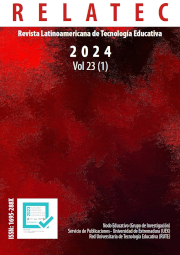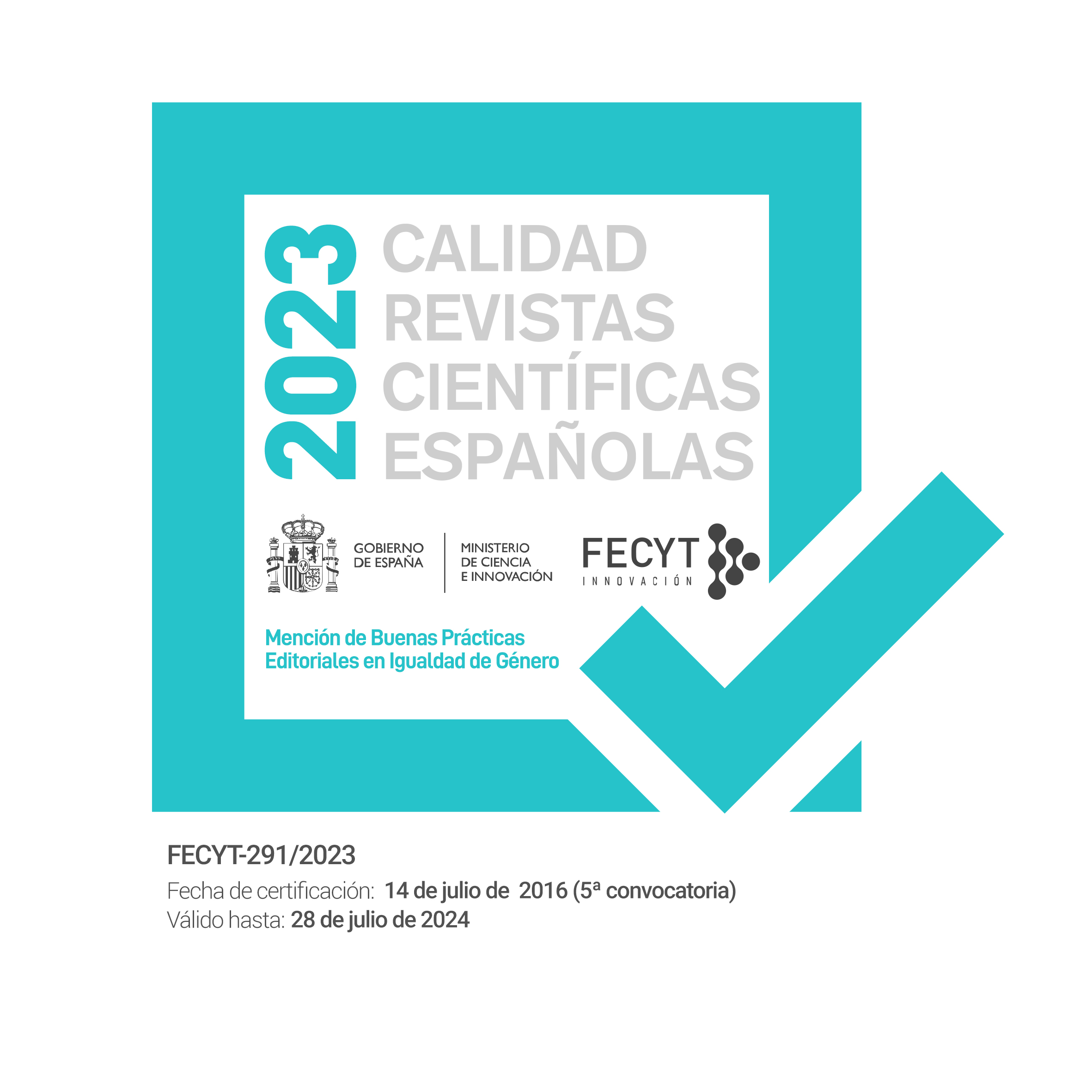Percepções dos professores estagiários sobre a aceitação das tecnologias móveis nos processos de ensino-aprendizagem. Um estudo de caso
DOI:
https://doi.org/10.17398/1695-288X.23.1.81Palavras-chave:
Ensino móvel, Professores estagiários, Investigação qualitativa, Grupo de discussão, Dispositivo móvel inteligenteResumo
A crise pandémica evidenciou a necessidade de uma transformação tecnológica e digital da universidade, um processo que já começou e que significou um antes e um depois na incorporação de tecnologias nos processos de ensino-aprendizagem. Por outro lado, os professores estagiários são um grupo privilegiado na medida em que estão no final do seu processo de formação, em contacto com professores activos e serão pilares da formação social. Assim, este estudo tem como objetivo analisar as percepções dos professores estagiários da Universidade de Granada sobre a aceitação e inclusão dos smartphones nos processos de ensino-aprendizagem, após a crise da pandemia de Covid-19. Foi implementada uma metodologia qualitativa (focus group) com uma amostra de 16 professores estagiários pertencentes à área das ciências sociais. Os resultados mostraram uma incorporação das tecnologias nos futuros professores, a necessidade de implementação de smartphones, bem como a literacia móvel de alunos e professores. De igual modo, foram destacadas as diferenças geracionais, a relevância da motivação e a perceção da utilidade e facilidade de utilização dos dispositivos. Conclui-se que são necessárias acções de formação para professores e centros educativos para dar uma resposta eficaz às necessidades sociais e educativas. Por conseguinte, as universidades, as instituições educativas e os professores devem esforçar-se por compreender o âmbito da aprendizagem móvel e as possibilidades dos smartphones no aumento da motivação e na aquisição de competências básicas. São necessários estudos futuros para alargar o âmbito da análise a diferentes áreas e contextos.
Referências
Adov, L., Pedaste, M., Leijen, Ä., & Rannikmäe, M. (2020). Does it have to be easy, useful, or do we need something else? STEM teachers’ attitudes towards mobile device use in teaching. Technology, pedagogy and education, 29(4), 511-526. https://doi.org/10.1080/1475939X.2020.1785928
Al-Emran, M., Mezhuyev, V., & Kamaludin, A. (2020). Towards a conceptual model for examining the impact of knowledge management factors on mobile learning acceptance. Technology in Society, 61, 101247. https://doi: 10.1016/j.techsoc.2020.101247
Al-Rahmi, A. M., Al-Rahmi, W. M., Alturki, U., Aldraiweesh, A., Almutairy, S., & Al-Adwan, A. S. (2022). Acceptance of mobile technologies and M-learning by university students: An empirical investigation in higher education. Education and Information Technologies, 27(6), 7805-7826. http://dx.doi.org/10.1007/s10639-022-10934-8
Alubthane, F., & ALYoussef, I. (2021). Pre-Service Teachers' Views about Effective Use of the Whatsapp Application in Online Classrooms. Turkish Online Journal of Educational Technology-TOJET, 20(1), 44-52.
Annamalai, N. (2018). How Do We Know What is Happening in Whatsapp: A Case Study Investigating Pre-Service Teachers’ Online Activity. Malaysian Journal of Learning and Instruction, 15(2), 207-225.http://dx.doi.org/10.32890/mjli2018.15.2.8
Aharony, N., & Gur, H. (2019). The relationships between personality, perceptual, cognitive and technological variables and students’ level of information literacy. Journal of Librarianship and Information Science, 51(2), 527-544.https://doi.org/10.1177/0961000617742450
Ata, R., & Cevik, M. (2019). Exploring relationships between Kolb’s learning styles and mobile learning readiness of pre-service teachers: A mixed study. Education and Information Technologies, 24(2), 1351-1377.https://link.springer.com/article/10.1007/s10639-018-9835-y
Batch, B., Roberts, J., Nakonechnyi, A., & Allen, R. (2021). «Cell Phones Under the Table”: Meeting Students’ Needs to Reduce Off-Task Smartphone Use Through Faculty–Student Collaboration. Journal of Educational Technology Systems, 49(4), 487-500.https://doi.org/10.1177/0047239520985449
Buabeng-Andoh, C. (2021). Exploring University students’ intention to use mobile learning: A research model approach. Education and information technologies, 26(1), 241-256.https://doi.org/10.1007/s10639-020-10267-4
Camilleri, M. A., & Camilleri, A. C. (2022). Learning from anywhere, anytime: Utilitarian motivations and facilitating conditions for mobile learning. Technology, Knowledge and Learning, 1-19. https://doi.org/10.1007/s10758-022-09608-8
Chahal, J., & Rani, N. (2022). Exploring the acceptance for e learning among higher education students in India: combining technology acceptance model with external variables. Journal of Computing in Higher Education, 1, 1-24. .http://dx.doi.org/10.1007/s12528-022-09327-0
Chen, C. H., & Tsai, C. C. (2021). In-service teachers' conceptions of mobile technology-integrated instruction: Tendency towards student-centered learning. Computers & Education, 170, 104224.https://doi.org/10.1016/j.compedu.2021.104224
Davis, F. D. (1989). Perceived usefulness, perceived ease of use, and user acceptance of information technology. MIS Quarterly, 13(3), 319-340. http://dx.doi.org/10.2307/249008
García-Martínez, I., Fernández-Batanero, J. M., Cobos Sanchiz, D., & Luque de La Rosa, A. (2019). Using mobile devices for improving learning outcomes and teachers’ professionalization. Sustainability, 11(24), 6917.https://doi.org/10.3390/su11246917
Gunawana, Y. L., & Danielb, D. R. (2020). The Development of an Online Job Marketing Information System: A Case Study of Accounting Graduates. Development, 11(9). https://doi.org/10.3727/109830508785059020
Habes, M., Elareshi, M., Salloum, S. A., Ali, S., Alfaisal, R., Ziani, A., & Alsridi, H. (2022). Students’ perceptions of mobile learning technology acceptance during Covid-19: WhatsApp in focus. Educational Media International, 59(4), 288-306. http://dx.doi.org/10.1080/09523987.2022.2153990
Hafour, M. (2022). The effects of MALL training on preservice and in-service EFL teachers’ perceptions and use of mobile technology. ReCALL, 34(3), 274-290. doi:10.1017/S0958344022000015
Hamidi, H., & Chavoshi, A. (2018). Analysis of the essential factors for the adoption of mobile learning in higher education: A case study of students of the University of Technology. Telematics and Informatics, 35(4), 1053-1070.https://doi.org/10.1016/j.tele.2017.09.016
Hsu, H. H., & Chang, Y. Y. (2013). Extended TAM model: Impacts of convenience on acceptance and use of Moodle. Online Submission, 3(4), 211-218. http://doi.org/ 10.12691/ajnr-5-6-7
Kearney, M., & Maher, D. (2019). Mobile learning in pre-service teacher education: Examining the use of professional learning networks. Australasian Journal of Educational Technology, 35(1), 135.148, https://doi.org/10.14742/AJET.4073
Krouska, A., Troussas, C., & Sgouropoulou, C. (2022). Mobile game-based learning as a solution in COVID-19 era: Modeling the pedagogical affordance and student interactions. Education and Information Technologies, 27(1), 229-241.https://doi.org/10.1007/s10639-021-10672-3
Kumar, J. A., Bervell, B., Annamalai, N., & Osman, S. (2020). Behavioral intention to use mobile learning: Evaluating the role of self-efficacy, subjective norm, and WhatsApp use habit. IEEE Access, 8208058-208074.https://doi.org/10.1109/ACCESS.2020.3037925
Latham, D., Gross, M., & Witte, S. (2013). Preparing teachers and librarians to collaborate to teach 21st century skills: Views of LIS and education faculty. School Library Research, 16, 2165-1019. https://doi.org/10.5860/crl-343
Nikou, S. A., & Economides, A. A. (2017). Mobile-Based Assessment: Integrating acceptance and motivational factors into a combined model of Self-Determination Theory and Technology Acceptance. Computers in Human Behavior, 68, 83-95. https://doi.org/10.1016/j.chb.2016.11.020
Park, H., Kim, H. S., & Park, H. W. (2021). A scientometric study of digital literacy, ICT literacy, information literacy, and media literacy. Journal of Data and Information Science, 6(2), 116-138. https://doi.org/10.2478/jdis-2021-0001
Pinto, M., Caballero-Mariscal, D. ,& Segura, A. (2021). Experiences of information literacy and mobile technologies amongst undergraduates in times of COVID. A qualitative approach. Aslib Journal of Information Management, 74, 181-201. https://doi.org/10.1108/ajim-10-2020-0333
Rosli, M. S., Saleh, N. S., Md. Ali, A., Abu Bakar, S., & Mohd Tahir, L. (2022). A Systematic review of the technology acceptance model for the sustainability of higher education during the COVID-19 pandemic and identified research gaps. Sustainability, 14(18), 11389. https://doi.org/10.3390/su141811389
Sánchez-Prieto, J. C., Olmos-Migueláñez, S., & García-Peñalvo, F. J. (2019). Informal tools in formal contexts: Development of a model to assess the acceptance of mobile technologies among teachers. Computers in Human Behavior, 55, 519-528.https://doi.org/10.1016/j.chb.2015.07.002
Sitar-Taut, D. A., & Mican, D. (2021). Mobile learning acceptance and use in higher education during social distancing circumstances: an expansion and customization of UTAUT2. Online Information Review, 45(5), 1000-1019. https://doi.org/10.1002/hbe2.261
Trninić, D., Kuprešanin Vukelić, A., & Bokan, J. (2021). Perception of «Fake News»and Potentially Manipulative Content in Digital Media—A Generational Approach. Societies, 12(1), 3-24. https://doi.org/10.3390/soc12010003
Valtonen, T., Hoang, N., Sointu, E., Näykki, P., Virtanen, A., Pöysä-Tarhonen, J. ...& Kukkonen, J. (2021). How pre-service teachers perceive their 21st-century skills and dispositions: A longitudinal perspective. Computers in Human Behavior, 116, 106643. https://doi.org/10.1016/j.chb.2020.106643
Walker, Z., Kho, H. H., Tan, D., & Lim, N. (2020). Practicum teachers’ use of mobile technology as measured by the technology acceptance model. Asia Pacific Journal of Education, 40(2), 230-246. https://doi.org/10.1080/02188791.2019.1671808
Wali, A., & Omaid, M. (2020). The use of smartphones as an educational tool in the classroom: Lecturers’ perceptions. International Journal of Emerging Technologies in Learning (IJET), 15(16), 238-247.https://doi.org/10.3991/ijet.v15i16.14179%0d
Wong, L. W., Tan, G. W. H., Hew, J. J., Ooi, K. B., & Leong, L. Y. (2022). Mobile social media marketing: a new marketing channel among digital natives in higher education?. Journal of Marketing for Higher Education, 32(1), 113-137.https://doi.org/10.1016/j.ijinfomgt.2019.08.005
Zhonggen, Y., & Xiaozhi, Y. (2019). An extended technology acceptance model of a mobile learning technology. Computer Applications in Engineering Education, 27(3), 721-732. http://dx.doi.org/10.1002/cae.22111
Downloads
Publicado
Edição
Secção
Licença
Direitos de Autor (c) 2024 David Caballero-Mariscal

Este trabalho encontra-se publicado com a Licença Internacional Creative Commons Atribuição-NãoComercial-SemDerivações 4.0.
Los autores/as que publiquen en esta revista aceptan las siguientes condiciones:
1. Los autores/as conservan los derechos de autor y ceden a la revista el derecho de la primera publicación, con el trabajo registrado con la licencia Creative Commons Reconocimiento-NoComercial-SinObraDerivada 4.0 International (CC BY-NC-ND), que permite a terceros utilizar lo publicado siempre que mencionen la autoría del trabajo y a la primera publicación en esta revista.
2. Los autores/as pueden realizar otros acuerdos contractuales independientes y adicionales para la distribución no exclusiva de la versión del artículo publicado en esta revista (p. ej., incluirlo en un repositorio institucional o publicarlo en un libro) siempre que indiquen claramente que el trabajo se publicó por primera vez en esta revista.
3. Se permite y recomienda a los autores/as a publicar su trabajo en Internet (por ejemplo en páginas institucionales o personales) antes y durante el proceso de revisión y publicación, ya que puede conducir a intercambios productivos y a una mayor y más rápida difusión del trabajo publicado (vea The Effect of Open Access).









